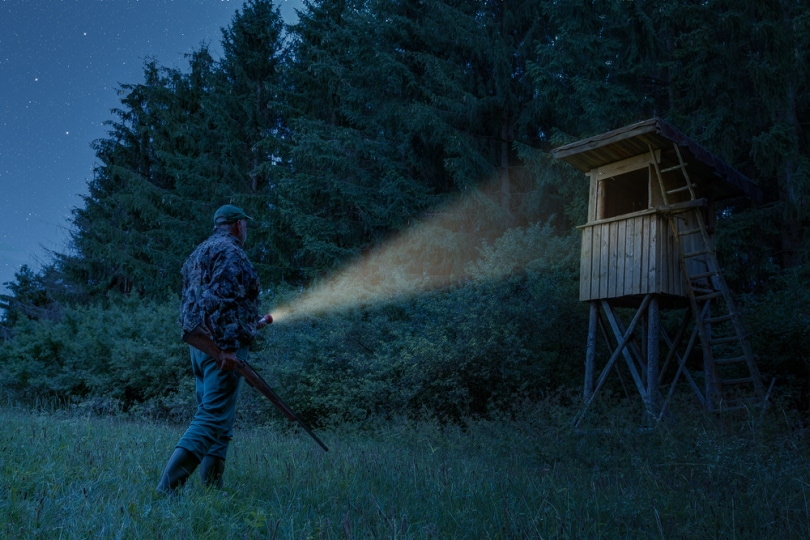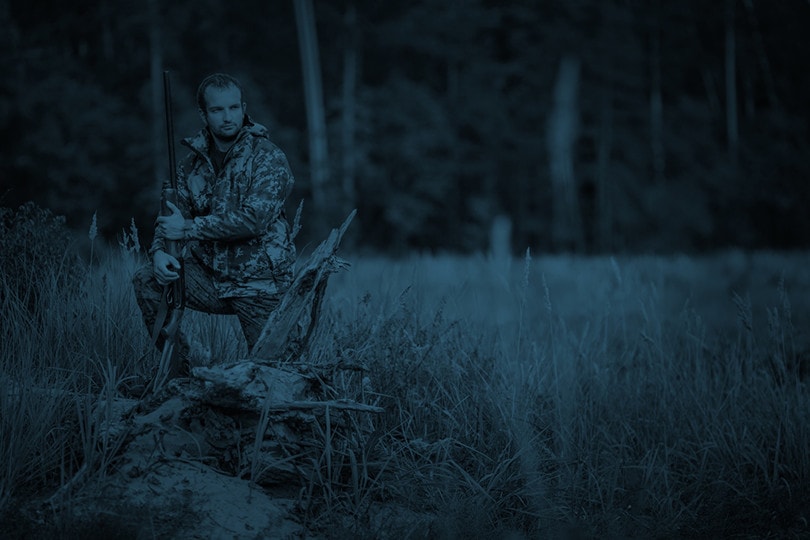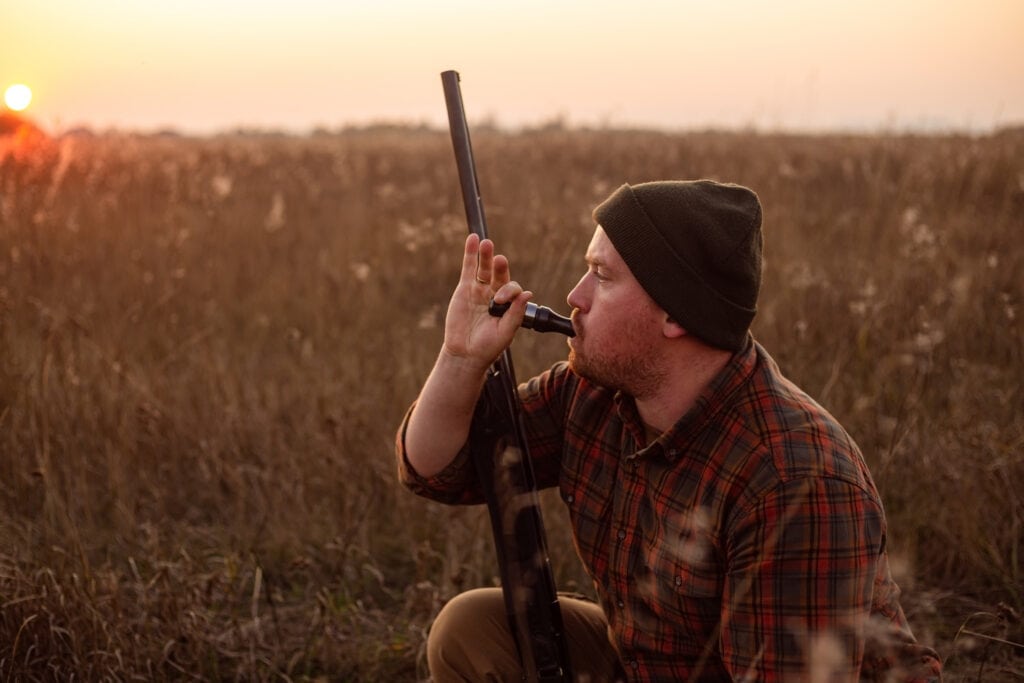Can You Hunt at Night? Everything You Need to Know
Last Updated on

Hunting laws may get confusing at times. Every country and state has its regulations, and it is always wise to go through them before stepping out.
When it comes to hunting a game at night, it is universally declared illegal for some species.1 You can’t hunt turkey, moose, deer, and elk. However, if you want to hunt non-game animals, you can do so at night except in Rhode Island and Mexico. You can only hunt raccoons in these places at night, and even then, it is only OK if you have a proper permit. Let’s explore more night hunting in detail.

Can You Hunt at Night?
It depends on where If you plan to hunt at night, make sure you know your state’s laws and regulations. Most jurisdictions allow the hunting of animals such as foxes, raccoons, wild hogs, bobcats, and coyotes. Many night-hunting enthusiasts consider these animals famous for this type of hunting because of lax regulations and because they are more active at night.
Another reason most states allow hunting of these animals at night is that they usually create a significant nuisance. When in a group or large quantity, these animals can wreak havoc, disturbing the people living nearby. Wild hogs often cause serious damage to properties, while coyotes usually end up killing goats. As a result, landowners often give permission to other hunters to kill these animals at night.
You may ask, can I hunt deer at night? Unfortunately, hunting deer at night is not legal. You may have to pay hefty fines if you do so.
There are a few exceptions, though. Some states may allow deer hunting at night only if it results in saving crops. A few landowners may get permission, but that permit is often given based on controlling animals rather than hunting them.
How to Hunt at Night
If your state permits you to hunt at night, there are many things you should consider for a smooth experience. Here is a list of things to keep in mind.
Ways to See at Night

If you think that night hunting is as convenient as day hunting, you may want to think twice. The biggest challenge of the night is the inability to see in the dark, and to overcome that, you should have proper tools in your gear.
For those who don’t mind an expensive solution, getting thermal devices or night-vision cameras is your best bet. Thermal devices are always pretty effective and can be helpful on even long expeditions.
You can always invest in readily available and affordable lights if you have a tight budget. Use red or green light. Animals may react differently to white light, and you might not be prepared for this challenge.
Choose Hunting Tools Wisely
The hunting tools that most hunters use at night are quite different from what they use during the day. So, while guns are allowed at night, make sure they are easily accessible and come with enough light to eliminate the darkness.
Many hunters prefer AR-style rifles. These are tactical weapons that make it easy for you to add accessories at night. The accessories could be laser sights or flashlight attachments. Some people often install silencers to reduce the sound a firearm produces.
Another good thing about this rifle is that it is pretty efficient. This weapon is semi-automatic, meaning you can fire it many times by adjusting the trigger. Further, these rifles have a magazine capacity which helps the shooter to maintain control over this weapon.
You should always have a separate kit designed specifically for night hunting. It should include essentials such as safety blankets, night vision gear, a fire-lighter, a hunting knife, a first aid kit, and a flashlight. Please ensure that the kit is approachable and that you don’t have to struggle with it.
Lots of Animal Activity at Night
Unlike during the day, animal activity at night is much more than expected. This is because animals don’t prefer to stay in hiding at night, which can help you hunt many species.
This is why many hunters find night hunting quite fun and thrilling. Of course, if you are doing this for the first time, you may get distracted by various sounds, which makes this activity more enjoyable.
Animals Have Better Night Vision
If you don’t want to scare an animal away, ensure you have a proper hiding spot at night. This is because most animals, compared to humans, have a much stronger vision at night, and even your flashlights may not work as efficiently. They may know about your presence before you spot them, so it is essential to be careful.

Methods for Night Hunting
The correct method may depend on many factors such as the animal, location, and the time of the year. There are two primary hunting methods you can use at night: hunting over a food source or bait and utilizing a caller.
Night Hunting Over a Bait
Many hunters use food sources or baits for hunting their preferred animals. This is one of the most traditional methods, but some jurisdictions have substantial restrictions for this method, so always check before using it.
While night hunting using a food source doesn’t require any unique tactics, it sometimes faces certain obstacles. The first one is poor vision due to darkness. You can overcome this hurdle by using light as recommended above.
Using a Caller
You may find a predator caller quite compelling if you are often on a hunt for foxes, coyotes, hogs, and bobcats. Make sure you have a proper tool for light to eliminate the darkness.
There are many devices available to help you produce a predator call. Both digital and electrical machines simulate the sounds of the animal.
When using a predator caller, ensure you are aware of the season. For example, suppose it’s summertime and you use a caller for an animal that isn’t prevalent during this season. In that case, you won’t be lucky when you hunt it.
Also, give the animal enough time to hear and react to your call. If you have used a set of callers to attract the animal, wait for at least 30 minutes before making a call again. Hunting requires patience, and its need increases during the nighttime.

Benefits of Hunting at Night
As long as you have the correct tool and method to hunt at night, there are many benefits that you can reap through night hunting.
- Night hunting is fun. Imagine sneaking in the dark and discovering an animal out of nowhere. The thrill involved in this experience is way beyond what you can imagine from a day hunting session.
If you like suspense, night hunting may trigger your excitement levels. Since animal activity is the strongest during this time, you may hear unexpected sounds that you won’t hear during the daytime.
- During summer, most animals often come out from their hiding spots during the night. They do so to avoid heat. This is an excellent chance for anyone to hunt as many animals as they want. It is also beneficial for the hunter to hunt at night. That’s because heat can be a massive distraction at times.
- Night hunting is pretty safe for humans roaming in the open fields. The chances of a local wandering in the fields are far less at night than in the morning. This factor reduces any risk of a fatal accident that you may regret later.

Summing Up
Whether you are a professional or a new hunter, hunting at night can be both challenging and fun. So, before you head out, ensure that your state allows you to hunt during the nighttime.
Make sure that you have the right gear, including a proper rifle and light to see through the darkness. A perfect light source is imperative to see through the dark.
To ensure your night hunting experience goes smoothly, choose the correct method and season to hunt. Also, cover yourself adequately to keep yourself safe from snakes.
Hunting at night is a fun experience as long as you are well prepared for it. If you aren’t, you may not get lucky or might have to pay hefty fines.
Featured Image Credit: Edgar G Biehle, Shutterstock
About the Author Jeff Weishaupt
Jeff is a tech professional by day, writer, and amateur photographer by night. He's had the privilege of leading software teams for startups to the Fortune 100 over the past two decades. He currently works in the data privacy space. Jeff's amateur photography interests started in 2008 when he got his first DSLR camera, the Canon Rebel. Since then, he's taken tens of thousands of photos. His favorite handheld camera these days is his Google Pixel 6 XL. He loves taking photos of nature and his kids. In 2016, he bought his first drone, the Mavic Pro. Taking photos from the air is an amazing perspective, and he loves to take his drone while traveling.
Related Articles:
Can You Use Binoculars to Look At Stars? How to Choose the Right Pair
How to Clean a Refractor Telescope: Step-by-Step Guide
How to Clean a Telescope Eyepiece: Step-by-Step Guide
How to Clean a Rifle Scope: 8 Expert Tips
Monocular vs Telescope: Differences Explained (With Pictures)
What Is a Monocular Used For? 8 Common Functions
How to Clean a Telescope Mirror: 8 Expert Tips
Brightfield vs Phase Contrast Microscopy: The Differences Explained
